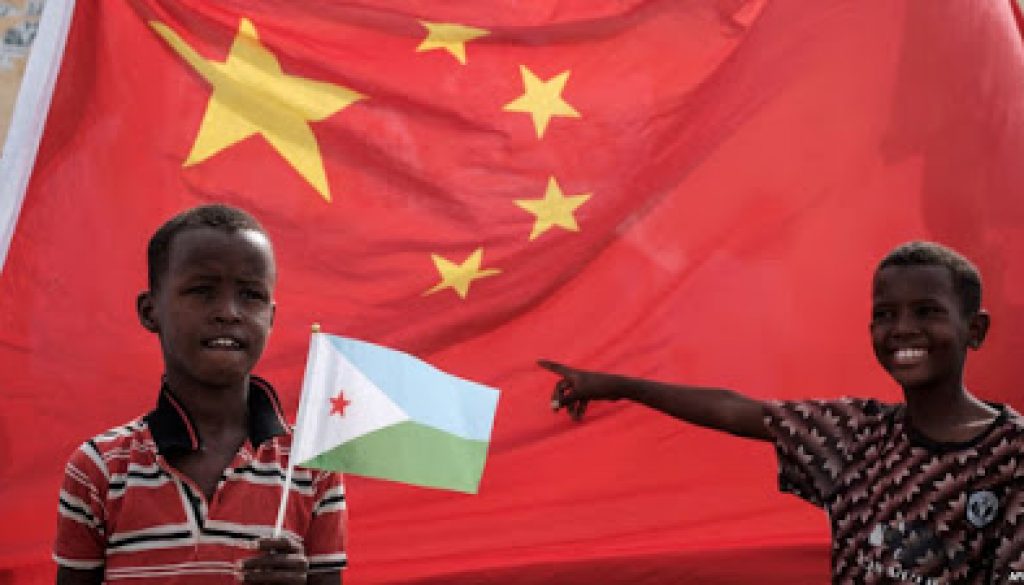Africa: Chinese Businesses Present Africa with Untapped Opportunities
Projects
like the $4 billion Standard Gauge Railway in Kenya and the $3.5
billion free-trade zone in Djibouti are among the biggest investments
African countries have made in their industrialization, with broad
implications for transportation and commerce.
like the $4 billion Standard Gauge Railway in Kenya and the $3.5
billion free-trade zone in Djibouti are among the biggest investments
African countries have made in their industrialization, with broad
implications for transportation and commerce.
And in 2015, China
did $188 billion worth of trade with Africa, more than the next top
three countries combined, according to a report from McKinsey and
Company, a global management consulting firm.
did $188 billion worth of trade with Africa, more than the next top
three countries combined, according to a report from McKinsey and
Company, a global management consulting firm.
But China’s
presence in Africa takes many forms, and some of the most important
opportunities for African countries aren’t in massive infrastructure and
trade deals, but instead with Chinese businesses that have been
boosting local economies around the continent.
presence in Africa takes many forms, and some of the most important
opportunities for African countries aren’t in massive infrastructure and
trade deals, but instead with Chinese businesses that have been
boosting local economies around the continent.
‘Many Chinas’
“There’s not one
China. There are actually many Chinas, all engaged in Africa at the
same. And all these different Chinas think and act differently and have
different interests and engage Africa in different ways,” said Irene
Sun, an engagement manager at McKinsey.
China. There are actually many Chinas, all engaged in Africa at the
same. And all these different Chinas think and act differently and have
different interests and engage Africa in different ways,” said Irene
Sun, an engagement manager at McKinsey.
Sun’s book, The Next Factory of the World, explores how Chinese firms have shaped local economies across Africa.
Partnerships with
private Chinese businesses are what is most important for ordinary
African citizens, Sun said. These enterprises have been investing in
technology, manufacturing and services, and that’s creating jobs and
newfound wealth.
private Chinese businesses are what is most important for ordinary
African citizens, Sun said. These enterprises have been investing in
technology, manufacturing and services, and that’s creating jobs and
newfound wealth.
“When you look at a
sector like manufacturing, this is really a sector that lets lots of
people who maybe didn’t get the chance to go to college, who haven’t had
a ton of skills development and training formally, it gets them into
the formal employment sector for the first time,” Sun said.
sector like manufacturing, this is really a sector that lets lots of
people who maybe didn’t get the chance to go to college, who haven’t had
a ton of skills development and training formally, it gets them into
the formal employment sector for the first time,” Sun said.
New strategies
Two sweeping
Chinese policy platforms have impacted Kenya: The Forum on China-Africa
Cooperation (FOCAC) and the Belt and Road Initiative — China’s
sprawling, multinational infrastructure project.
Chinese policy platforms have impacted Kenya: The Forum on China-Africa
Cooperation (FOCAC) and the Belt and Road Initiative — China’s
sprawling, multinational infrastructure project.
At the last FOCAC
summit, in December 2015, China met with African heads of state and
committed $60 billion in financing to the continent, triple the
commitment from three years before. Most of the contributions take the
form of low-interest concessional loans.
summit, in December 2015, China met with African heads of state and
committed $60 billion in financing to the continent, triple the
commitment from three years before. Most of the contributions take the
form of low-interest concessional loans.
And as part of the
Belt and Road Initiative, the railway from Nairobi to Mombasa became
Kenya’s most ambitious and expensive infrastructure project to date when
it opened in May 2017.
Belt and Road Initiative, the railway from Nairobi to Mombasa became
Kenya’s most ambitious and expensive infrastructure project to date when
it opened in May 2017.
Still, Kenya’s strategies for working with China continue to take shape.
“Kenya is not alone
in there being lots of opportunity to think through in more detail how
China’s involvement and interest in Africa can advance African
countries’ own national development goals,” Sun said.
in there being lots of opportunity to think through in more detail how
China’s involvement and interest in Africa can advance African
countries’ own national development goals,” Sun said.
The key for African
countries, Sun added, is to mesh what they already want to do, in terms
of infrastructure and job growth, with their unique strengths and
China’s specific interests.
countries, Sun added, is to mesh what they already want to do, in terms
of infrastructure and job growth, with their unique strengths and
China’s specific interests.
Beyond infrastructure
That means finding the right infrastructure projects but also looking for opportunities more broadly.
Sun sees the Standard Gauge Railway, which connects Kenya’s two largest cities, as a leap forward in the country’s development.
Travel between Nairobi and Mombasa by road is unpredictable and can take up to 15 hours.
“And now you have a
railway where you can get on a train and you can arrive at the other
end in five hours. That is completely game-changing for people movement
but, I think, perhaps more importantly for goods movement,” Sun said.
railway where you can get on a train and you can arrive at the other
end in five hours. That is completely game-changing for people movement
but, I think, perhaps more importantly for goods movement,” Sun said.
The railway has the
potential to help businesses operate more efficiently, drastically
reducing their costs. That’s likely to have significant economic
benefits and may attract new investment.
potential to help businesses operate more efficiently, drastically
reducing their costs. That’s likely to have significant economic
benefits and may attract new investment.
But massive infrastructure investments don’t come with guaranteed returns, and that presents an imminent danger.
In the case of the
Standard Gauge Railway, cargo shipments, which started in January, have
far underperformed projections. In March, Kenyan newspaper The East
African reported that volume was running well below estimates and raised
questions about the sustainability of the service.
Standard Gauge Railway, cargo shipments, which started in January, have
far underperformed projections. In March, Kenyan newspaper The East
African reported that volume was running well below estimates and raised
questions about the sustainability of the service.
There’s also a
danger, Sun said, in assuming that manufacturing requires good
infrastructure. A more complete strategy for African countries means
looking for opportunities that don’t require new roads and railways.
danger, Sun said, in assuming that manufacturing requires good
infrastructure. A more complete strategy for African countries means
looking for opportunities that don’t require new roads and railways.
Since Africa
doesn’t have much manufacturing yet, manufactured goods cost a lot to
produce. Firms who enter the market with improved technologies and
processes can find ways to lower costs and make significant profits.
doesn’t have much manufacturing yet, manufactured goods cost a lot to
produce. Firms who enter the market with improved technologies and
processes can find ways to lower costs and make significant profits.
Unavoidable risks
As investment in Africa accelerates, African countries will face certain risks and need to develop strategies to mitigate them.
“There are many
risks for Africa as it develops broadly and as it develops on the back
of foreign investment, whether it’s Chinese or not,” Sun said.
risks for Africa as it develops broadly and as it develops on the back
of foreign investment, whether it’s Chinese or not,” Sun said.
Those risks stand to impact both people and the environment.
Mining jobs carry
significant dangers to workers, and many factories have heavy machinery
that can cause injuries and death, creating a need for well-defined
standards and compliance across industries.
significant dangers to workers, and many factories have heavy machinery
that can cause injuries and death, creating a need for well-defined
standards and compliance across industries.
And as
industrialization accelerates across the continent, pollution and land
degradation will become more pressing concerns, underscoring the need
for regulation.
industrialization accelerates across the continent, pollution and land
degradation will become more pressing concerns, underscoring the need
for regulation.
By Salem Solomon




